Games Workshop has been granted a whopping $10.2 million final judgment from a US court. Here’s the latest on GW’s worldwide Warhammer crackdown against 170+ sellers.
If you’ve checked your favorite online marketplace lately and noticed a few listings mysteriously vanish, you’re not imagining things. Games Workshop dropped the legal equivalent of an orbital bombardment, originally suing 280 sellers across the globe and freezing their assets in one sweeping move.
The largest Games Workshop seller crackdown to date has shut down stores, locked accounts, and panicked vendors. Some were clearly pushing counterfeit kits, while others got hit for less obvious reasons, like using the word Citadel in a brush holder listing.
Let’s break down the complete list of who was caught in the blast radius, the backtracking, and what this means for the miniatures hobby overall.
TL;DR
Originally published in May 2025. Updated on November 2nd, 2025, by Rob Baer with the latest update from sellers and Games Workhop
In April 2025, Games Workshop went full legal Exterminatus on the online miniatures market, and no one was safe, not even your brush holder.
If you’re selling Warhammer-adjacent stuff online, even brushes or bits, this case should be on your radar. From surprise lawsuits to frozen PayPals, here’s the drama so far:
- GW filed a massive lawsuit against (originally) 280 online sellers for Warhammer IP infringement; think fake minis, logos, and sketchy product listings.
- GW has received a massive judgment from a US court for $60,000 in damages from each of the 170 defaulting defendants (sellers), totaling over $10 million.
- On May 27, 2025, the court issued a preliminary injunction, shutting down sales and locking assets.
- Accounts and funds were frozen across platforms like Etsy, eBay, Alibaba, AliExpress, and Wish.
- GW quietly removed some wrongly accused sellers from the case, but the damage (and drama) may already be done.
- Many were asked to pay $2,000 to $10,000 in “damages” by GW’s lawyers… after their assets were frozen.
- Some well-known companies like KR Multicase and Green Stuff World also got hit, raising eyebrows across the hobby.
- Tabletop Tyrant, a UK shop, tried to fight back solo; the judge said companies can’t self-represent. Lawyer up or get tossed.
- With $10k bonds per seller, GW could be on the hook if the court finds overreach, up to $2.8 million in bond coverage.
GW Granted $10,000,000 in Damages
In the finalized lawsuit, Games Workshop targeted over 160 sellers from around the globe for slapping Warhammer trademarks on bootleg minis, counterfeit kits, and suspiciously familiar figures.
For many defendants, GW is now allowed to collect $60,000 in statutory damages, unless they made over $20,000 in infringing sales, in which case treble profits are requested. This puts the damages well into the $10 million range.
A huge chunk of this list comes straight out of Alibaba, which, according to the data, is the mothership of these operations. That’s right, factory-scale production lines are cranking out knockoff resin like it’s rations on Cadia.
Out of all the sellers listed, the vast majority are based in China, with a smattering of names from elsewhere tossed in like garnish. Games Workshop isn’t playing whack-a-mole with hobbyists printing heads in their basement.
They’re aiming squarely at industrial-scale sellers offering “Warhammer-style” armies and merchandise at rock-bottom prices, often using the Warhammer name itself to boost search hits.
The lawsuit accuses them of straight-up trademark infringement, false advertising, and counterfeiting. GW’s legal team has also been granted a permanent ban on these sellers doing business under their current domains, the deletion of product listings, and even a transfer of website names.
Scale of Sellers & Platforms
What makes this interesting is the scale. This isn’t just one or two bad actors; it’s a broad crackdown that reads like a who’s-who of suspicious storefronts.
And with most of the defendants not bothering to respond in court, GW’s default judgment has now gone through cleanly. That means poof, websites gone, accounts nuked, and wallets potentially scorched.
List of Affected Sellers:
The following is a list of affected sellers, alphabetized for clarity, according to the official final judgment as of August 7th, 2025.
- 3DominatorIT
- AdAstraCollection
- alexaftermarket
- APstudio3D
- Artagnok Cosplay
- ArtOWarStore
- ArtPaintingsGoods
- axis_3d_pro
- avihayg9
- avocations_ltd
- back2base-ix
- bambam3d_studio
- Baron of Dice Inc.
- battleround
- BBRubbers
- bloodybeast_com
- Bodgehawk
- BoneshopDE
- brickcraftersworkshop
- Branden Arthur
- Calseboli
- Caoxian Shinehome Artware Co., Ltd.
- christie6153
- cyber-craft
- dang10
- darkminiatures
- DB Imps&exps Co. (Guangzhou) Ltd.
- Dedert
- Deploymats
- dhgworld
- dijayas5748
- dontthinkjustcharge
- donvaletechsales
- Dongguan Gubeite Hardware Technology Co., Ltd.
- Dongguan Utrust Craft Products Co., Ltd.
- EnchantedApparelUK
- EpicForged
- essential_hoodie
- everythingcanada
- Ezhou Tongguodou Trading Co., Ltd.
- FaelysiumWonders
- Foshan Haofan Trading Co., Ltd.
- frenergymagnets
- g4sky
- gearhomie
- GamesGear
- GeekTradingCo
- GreenRoboRabbit
- greenstuffworld
- greyhawktrading
- Guangzhou Longcheng Ceramics Co., Limited
- Guangzhou Tjkd Watch Co., Ltd.
- Guangzhou Zilong Tech Co., Ltd.
- HamsterOver
- HandmadeeBC
- Hangzhou Jukui Technology Co., Ltd.
- Hangzhou Yufan Technology Co., Ltd.
- HeroesMaskDesign
- Huizhou Findle Computer Embroidery Co., Ltd.
- Huizhou Yingyihui Import And Export Trading Co., Ltd.
- imfadcom
- innofinity-worldwide
- Iqfun (Guangzhou) Trading Co., Ltd.
- iover_9000i
- jacksdrawingsgb
- jeepdecalstore
- JLA3DPrinting
- KellersCustomPrints
- KhadeemsDivinations
- k_r_multicase
- LaForgiaDeiLeinad
- LaserPatch
- LeeanderthalSHOP
- lianwu09
- LMX3D
- linoos
- LLhandmadeclothing
- lower-and-shiner-store
- LyrikCo
- magprint3d
- MageFireMiniatures
- marpark8902
- middletown
- Mini Monsters Shop
- misterdollar1328
- moveekbuddyshop
- narkuk
- navara_cases
- newworld.discounts
- NewportMesaGraphic
- NicheNerdGoods
- Ningbo Jinghai Machinery Co., Ltd.
- Ningbo Sunrise Trading Co., Ltd.
- olylin1
- otakuplan
- PivertFrame
- Pixmium
- Printorians3D
- propsandpixel
- Quotechella Merch
- RRetroPrints
- ReapersPotions
- RedGoblinShop
- RetroforgeCreations
- RobaPop
- robsvintagecuriosities
- Rog0mirStudio
- roamingwanderer
- safrig55
- ServoPrinter
- Shenzhen 374 Technology Co., Ltd.
- Shenzhen Aiyouyue Industrial Co., Ltd.
- Shenzhen Bangjiashun Industrial Co., Ltd.
- Shenzhen CLC Game And Gift Limited
- Shenzhen Hairan Digital Co. Ltd.
- Shenzhen Hongheng Technology Co., Ltd.
- Shenzhen Jianai Craft Jewelry Co., Ltd.
- Shenzhen Jinzhibao Trading Co., Ltd.
- Shenzhen Jms Crafts Ltd.
- Shenzhen Li Chen Trading Co., Ltd.
- Shenzhen Lifun Bags And Gifts Co., Ltd.
- Shenzhen Luomen Crafts Co., Ltd.
- Shenzhen Mingxin Craft Jewelry Co., Ltd.
- Shenzhen Sandes Acrylic Products Co., Ltd.
- Shenzhen Sndn Outdoor Products Co., Ltd.
- Shenzhen Tianyun Arts & Crafts Co., Ltd.
- Shenzhen Xin Hemei Toys Firm
- Shenzhen Xinnawei Technology Co., Ltd.
- Shenzhen Xinrong Craft Jewelry Co., Ltd.
- Shenzhen Xinrui Gifts And Crafts Co., Ltd.
- Sisclosett
- solar-e-clips
- southcartART
- StarWhaleMiniatures
- Stasunoka
- stormmerch
- SuperHeroArtPrints
- Tabletop Tyrant
- tacticalharz
- TCGtackle
- Techworkshop
- ThatCoolMerch
- The Individuals, Partnerships, and Unincorporated Associations Identified on Schedule A
- ThundersnailCreates
- todordigital
- toonto_47
- ua_boulder
- ua_clearwater
- ua_irvine
- ua_riverside
- ua_sacramento
- ua_sebastian
- uledemode_official
- VenekGifts
- vieke
- wargames.shop
- WargamingPrinting3D
- WarpedRealms
- WavecolorsTabletop
- willys_minis
- Wuxi Stoter Import And Export Company Ltd.
- yggdrasil7
- Yiwu Haofeng Stationery Co., Ltd.
- Yiwu Shengzhou Stationery Co., Ltd.
- Yiwu Zhuanxin Import And Export Co., Ltd.
- Yiwu Zhuanxing Trading Co., Ltd.
- Yunhe County Jiemu Toys Co., Ltd.
- Zemtslab3D
- Zhangjiagang Topwin Rubber & Plastic Products Co., Ltd.
- zombihand
- zzaaqvw
So What Does It Mean For Us?
So, what does this mean for the Warhammer hobby? For starters, it signals GW’s growing focus on shutting down the counterfeit market, not just for profit protection but to keep the branding clean. It’s hard to sell premium plastic or merch when knockoffs are floating around online for half the price with the same name.
If you’ve ever stumbled across a suspiciously cheap “compatible” miniature or been tempted by a full army for the price of a Combat Patrol, there’s a decent chance it came from one of the sellers on this list. Now, with the legal hammer falling, that temptation might vanish from your search results entirely.
Games Workshop Nukes 200+ Online Sellers
On May 27, 2025, a federal judge in Florida handed Games Workshop a legal win against more than 200 defendants, the vast majority of whom seem to be Warhammer counterfeit sellers. The Judge granted a preliminary injunction against these sellers.
Overall, these weren’t just hobbyists with a few extras lying around. They were running storefronts on Amazon, eBay, AliExpress, Wish, and Etsy, pushing fake Warhammer gear like it was no big deal.
Spoiler alert, it was a big deal. The court hit them with a preliminary injunction that restricts the defendants from:
- Selling, distributing, advertising, or offering any goods using the Warhammer Marks or confusingly similar trademarks.
- Hiding, moving, or destroying counterfeit goods and related business or financial records.
This isn’t just bad news for fake Warhammer sellers. It could rattle smaller resellers too, especially those juggling unofficial bits or mixed inventory.
The original suit targeted over an initial tally of 280 sellers, but, as we reported, many seem to have been caught up in this by accident. The good news is that they didn’t call out 3D printing bits or fan art, but the message still hangs in the air.
The Nitty-Gritty Allegations
The case leverages a controversial Florida legal tactic called the “Schedule A Defendant Scheme” (SAD). This allows a single lawsuit against many defendants for intellectual property enforcement.
Here’s how it played out: GW (through their lawyers the Brickell IP Group ) supposedly did a sort of round of undercover test purchases. Those orders didn’t pass muster. They said the goods were fake, low quality, or designed to imitate official Warhammer products. They may have even contained prohibited had logos, box art, and product names, etc.
Such incidents can cost a company more than just a few sales. The bigger fear that GW is claiming is brand dilution. If people can’t trust the quality of what they’re buying, that hurts those involved in the legit hobby, from independent shops to the players themselves.
In an effort to keep sellers from bailing out, hiding assets, or wiping their shop pages, GW made sure no advance warning was given before a Temporary Restraining Order (TRO) hit.
What the Court Did About It
On April 22, 2025, the court signed off on a TRO as part of the full complaint, and that’s when things got serious. The TRO has been converted into a preliminary injunction as of May 27, 2025.
Here’s what came down:
- Sales Freeze: Sellers had to stop selling anything infringing.
- Asset Freeze: Their financial accounts were locked.
- Expedited Discovery: Marketplaces like Amazon, eBay, and AliExpress were ordered to hand over seller details.
- Third-Party Compliance: Platforms had to freeze and disclose info on the accused sellers.
- Alternative Service: GW was allowed to notify defendants via email and Dropbox links. Yes, really.
- Bond Requirement: Games Workshop posted a bond of $10,000 per seller to cover potential damage if the court later finds they overreached. With 280 sellers, that’s potentially up to $2.8 million in bonds alone, not counting the legal bill.
If you’re thinking that’s a lot of legal firepower over some minis, well, you’re not wrong.
GW Swings, Then Realizes It Hit the Wrong Targets
Games Workshop went full courtroom crusader on 280 sellers for alleged trademark infringement. However, it turns out that several dozen of them were totally innocent. Cue the awkward “oops” emails.
Several dozen sellers, who were perhaps victims of Games Workshop’s overreach, managed to wriggle out of the net. Their complaints were quietly removed. Which is nice… but doesn’t exactly fix the mess for the other handful that were also unfairly targeted.
Since we first reported on this legal sweep, a dozen or so sellers have reached out to us, all saying the same thing: “We got hit too, and we’re not even sure why.”
Like mentioned in the No guts, No galaxy Warhammer mech Battletech video, some of them didn’t reply by the May 12th deadline, not out of defiance, but because they had no idea they were even on the hit list.
No formal notice, no friendly email, just radio silence… until they saw their PayPal frozen and their listings wiped.
Most have indicated that they have been asked to pay between $2000 and $10,000 in “damages” by the Brickell IP Group (after their assets are frozen, mind you). Some have even taken to Reddit to ask for legal advice.
Details DO Matter
Yup, GW froze accounts, locked up funds, and threw sellers into legal limbo… after forgetting actually to proofread their work. Then they quietly started backpedaling. If you were wrongly caught in the net, congrats. You might be getting dropped from the suit (and maybe a half-hearted apology to go with it).
That’s where the $10,000 bond per seller matters. If any of these claims are ruled excessive or unjustified, those funds could help cover damages to wrongly targeted sellers.
This part gives strong “Spots the Space Marine” vibes, if you remember the infamous takedown campaign from a decade ago. Add in the recent YouTube copyright strikes, and you’ve got a pattern. Potential over-enforcement with a side of PR misfire.
Full story here if you want the legal drama in all its grimdark glory.
No Lawyer? No Entry.
TL;DR
- Tabletop Tyrant tried to respond without a lawyer. Judge said “nope.”
- Businesses must be represented by counsel, pro se is off the table.
- This makes things a lot harder for the 200+ mostly out-of-country defendants.
- The May 27 preliminary injunction still stands.
In a recent twist that’s got more bite than a Carnosaur, the court even smacked down an attempt by UK seller Tabletop Tyrant to represent itself in the Games Workshop lawsuit case. The reason? Businesses can’t pull a DIY legal move.
Judge Altman cited Palazzo v. Gulf Oil Corp., a case that basically says: if you’re a company, you’re not a person, and you don’t get to argue in court without a lawyer.
PAPERLESS ORDER striking Motion to Dismiss. The Motion was filed on behalf of Defendant Tabletop Tyrant by “Dustin Smith, Company Director.” Motion at 2. But businesses like Tabletop Tyrant are “artificial entit[ies]” that “cannot appear pro se, and must be represented by counsel.” Palazzo v. Gulf Oil Corp. , 764 F.2d 1381, 1385 (11th Cir. 1985). If Tabletop Tyrant wishes to appear in this case, it must hire a lawyer to represent itself. Any future pleadings filed by an officer or employee on behalf Tabletop Tyrant will be stricken. Signed by Judge Roy K. Altman on 6/4/2025.
That’s bad news for the 200+ defendants now sweating under a preliminary injunction from May 27th. A lot of these are small shops based outside the U.S., and this ruling just made it a lot trickier (and pricier) for them to respond.
It’s tough enough wrangling customs and shipping, now toss in U.S. legal fees?
Final Thoughts
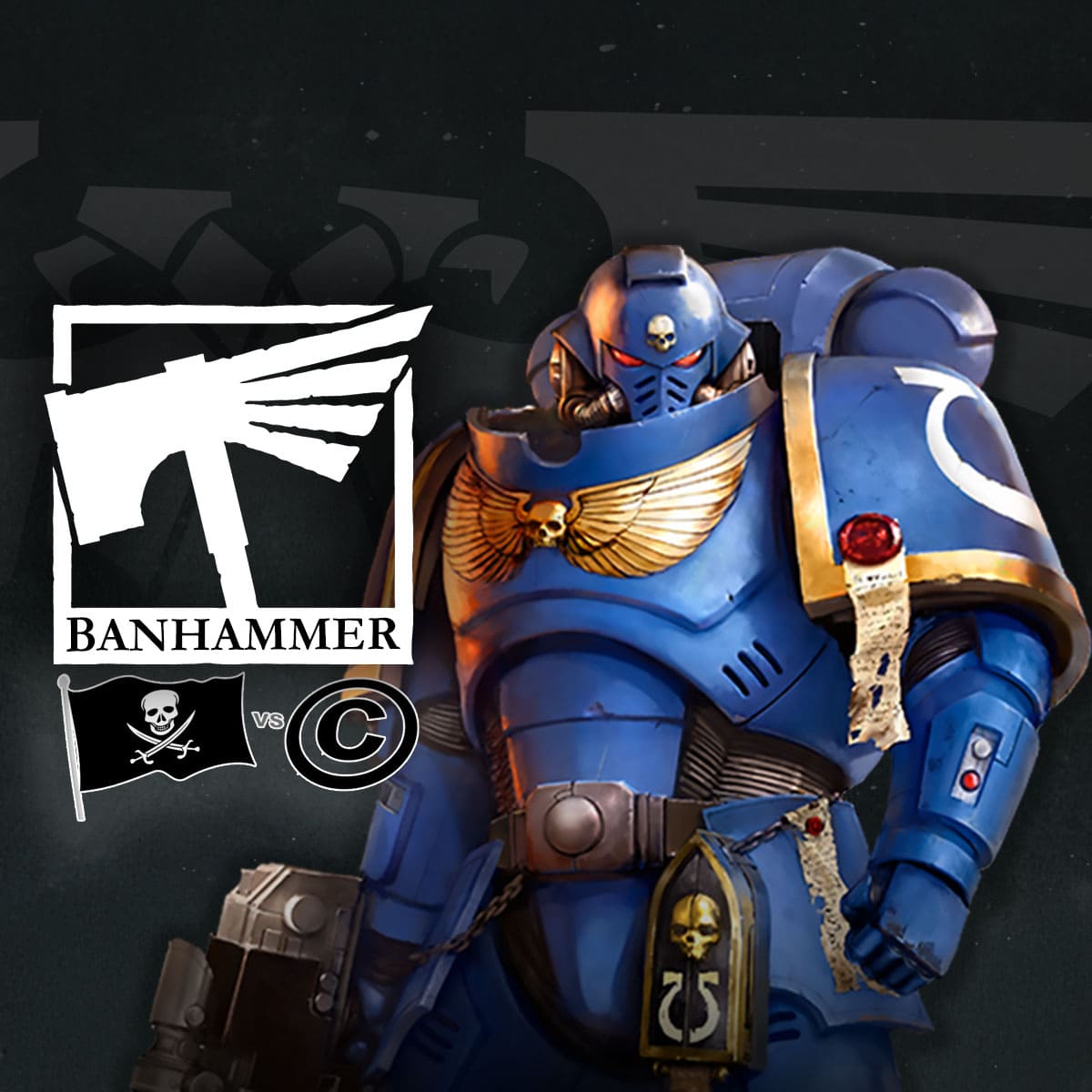
Games Workshop’s legal action is drawing a hard line. Whether it’s the right one, and whether they’ll keep the community on their side while doing it, is still an open question.
Latest GW Takedown of YouTube Creators
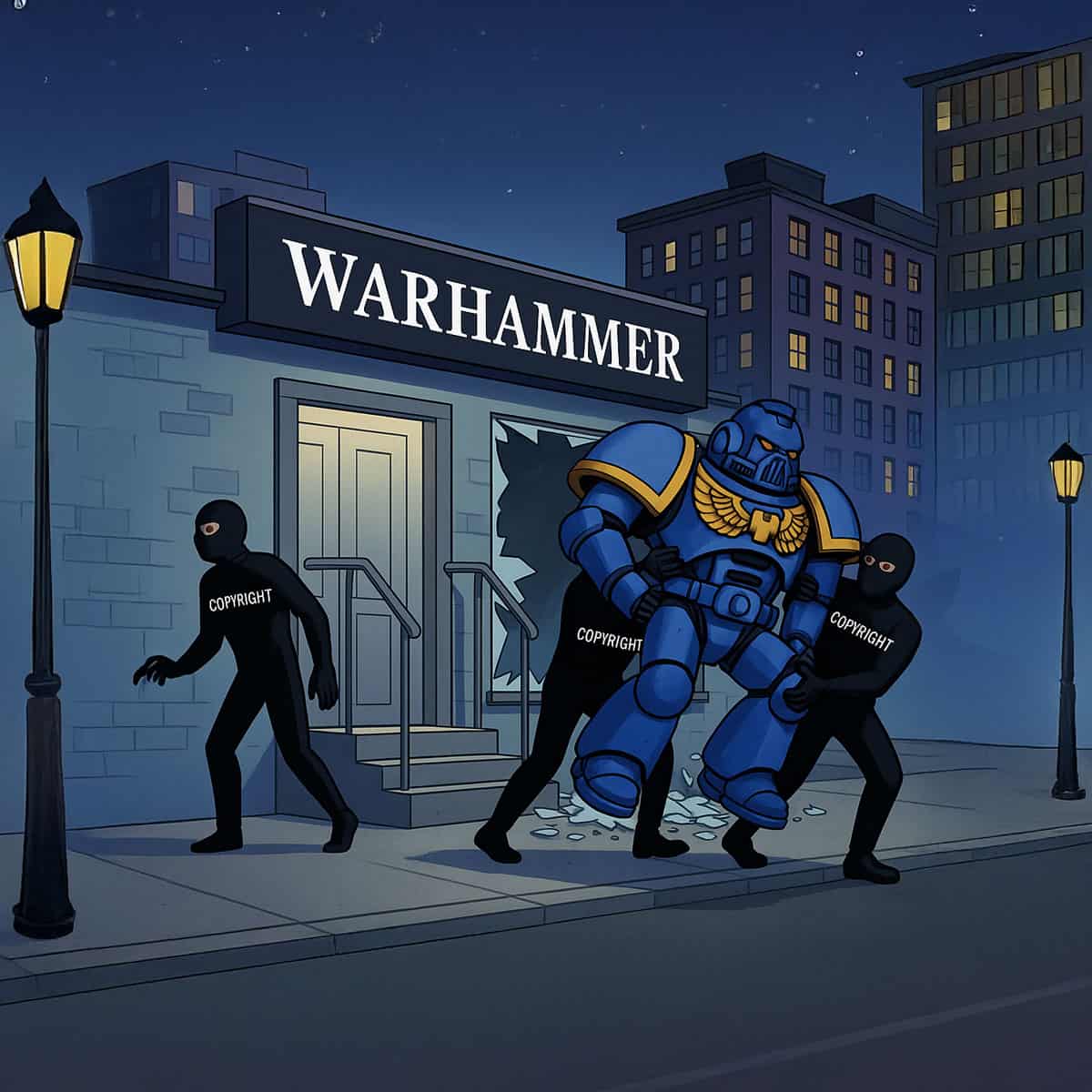

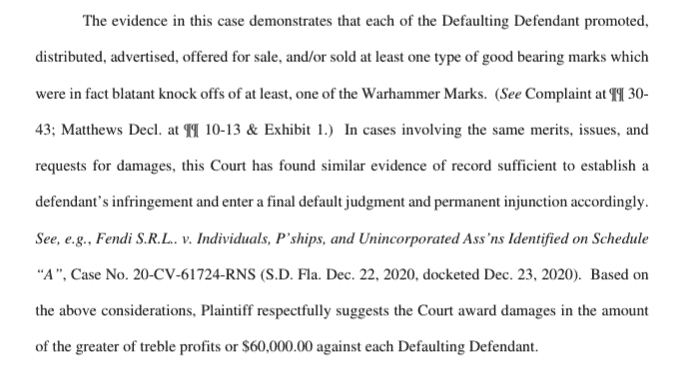


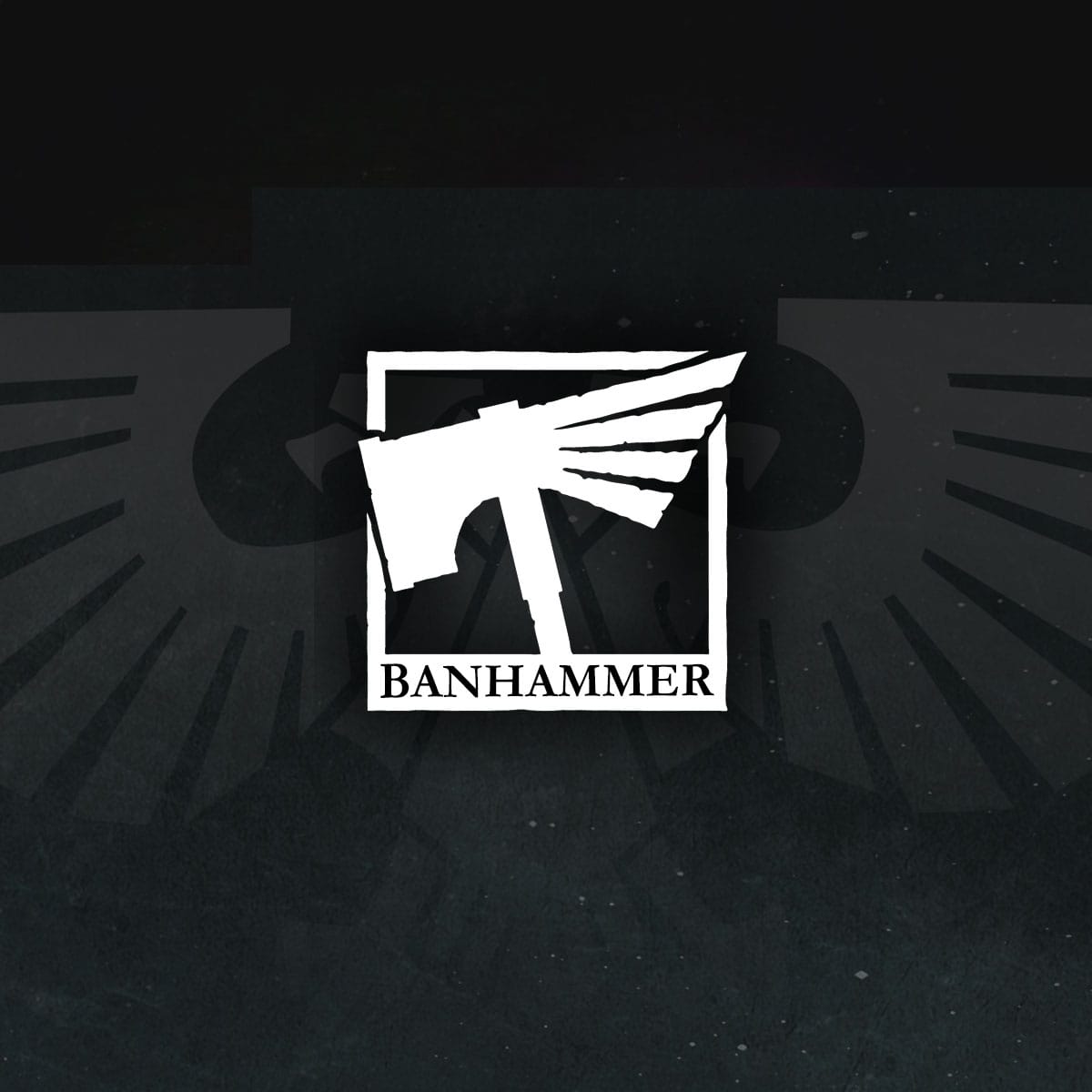
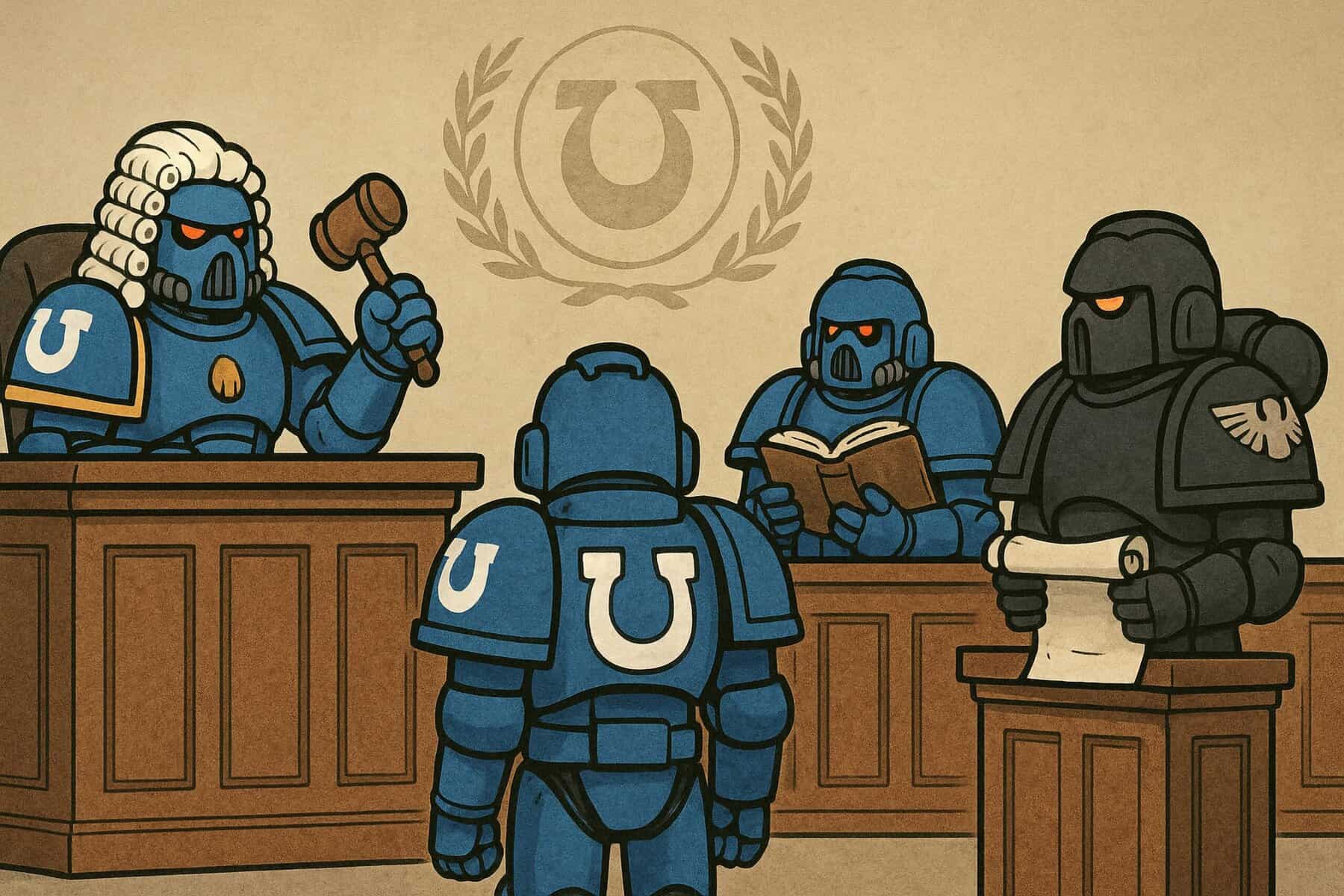
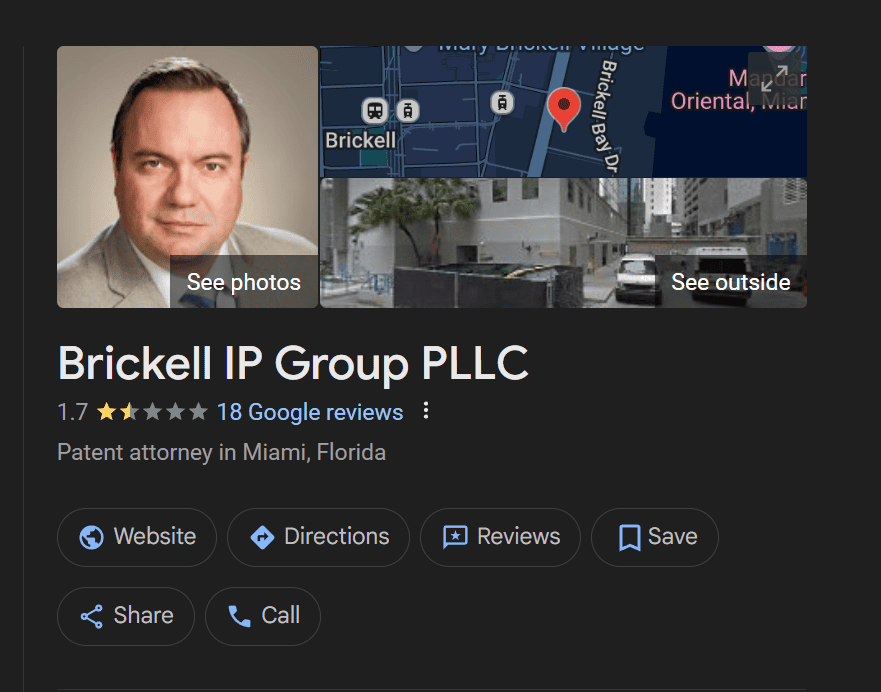
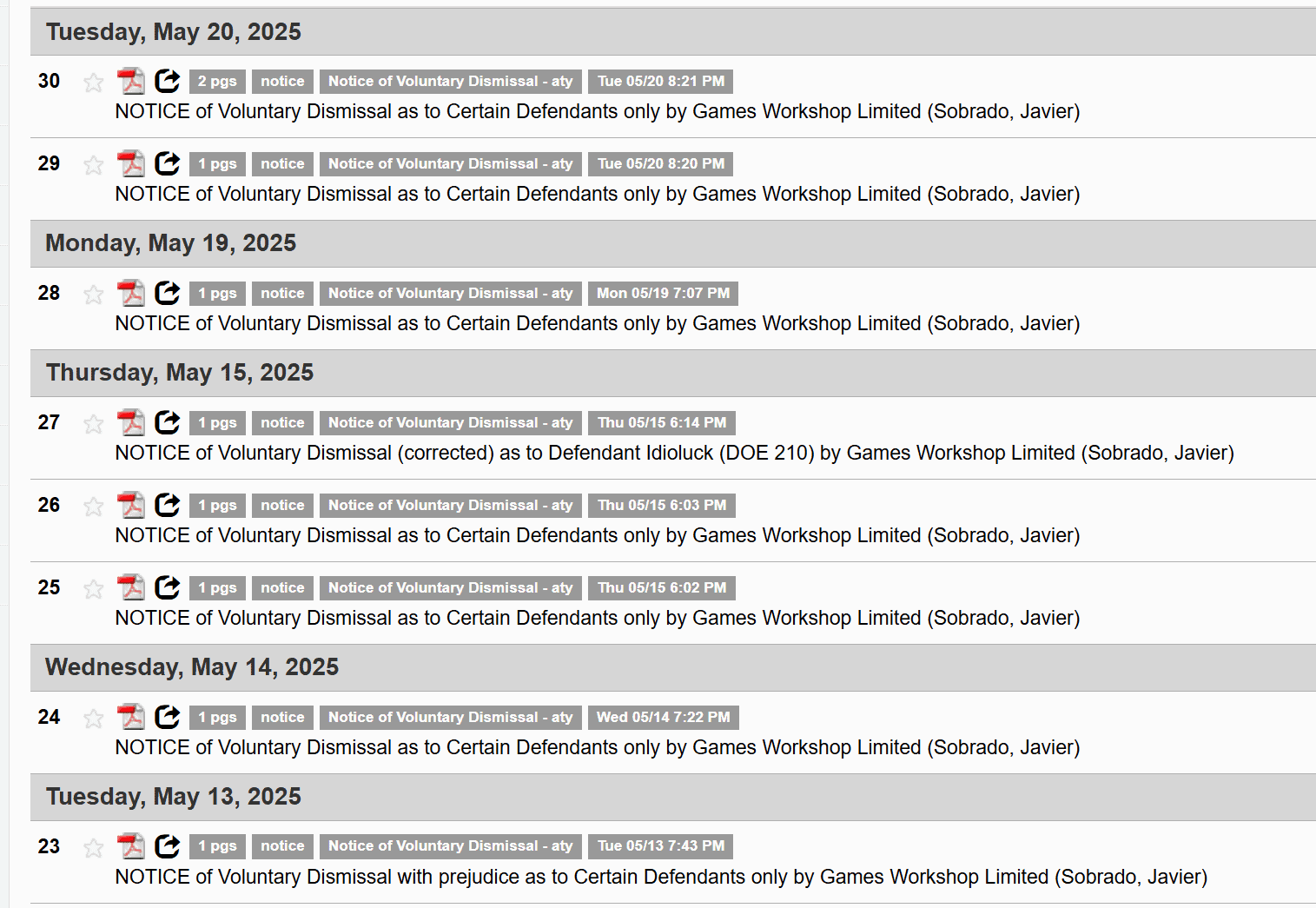

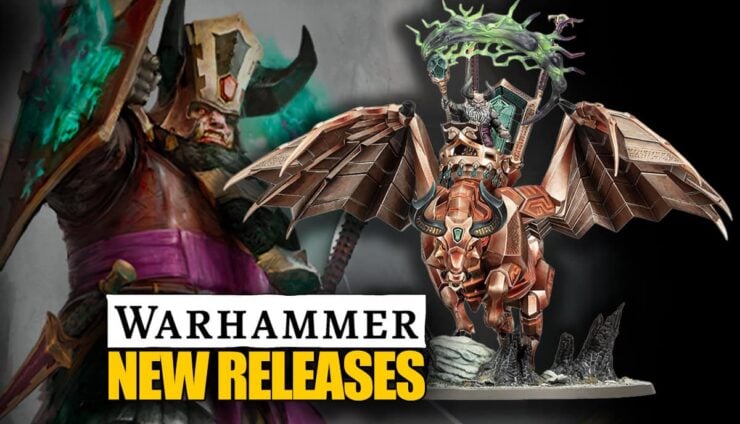
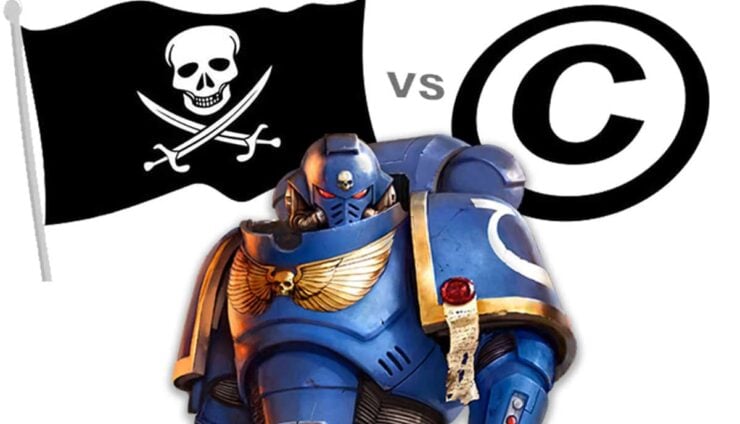
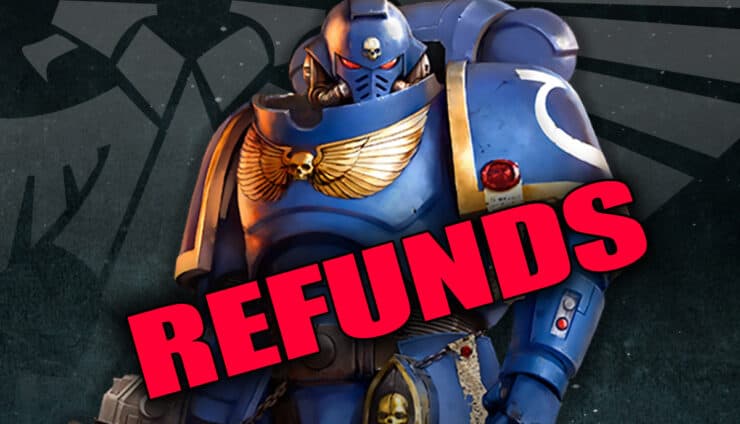

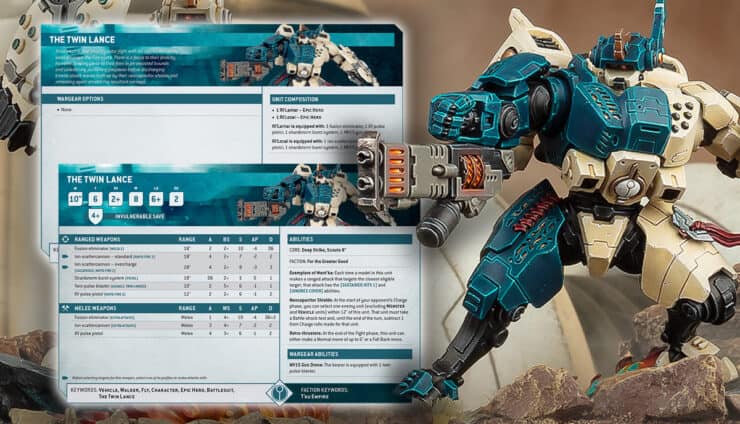
Now if Disney does the same thing to all the Star Wars Armada, X-Wing, and Legion makers, we’re gonna see another shakeup!
Now if Disney does the same thing to all the Star Wars Armada, X-Wing, and Legion makers, we’re gonna see a
I agree with several comments here, GW raises prices 5-10% every year or two and throw in our faces that they are bringing in record profits. Then shower their execs with a nice portion of those profits in bonuses. Then tell us there will be continued shortages and out of stock on many individual kits as well as bundle kits.
Plus they pretty much did this to themselves when they started having plastics and books manufactured in southern Asia and elsewhere. Basically handing over their info to the copy cats. 26 years ago when I worked for GW in Baltimore, they did nearly all production in house. From metal casting to box printing and books. Some was done overseas but in UK by GW. Not an affiliate or contract company.
I refuse to buy direct from GW due to their own price gouging. If I can get a kit from them at $65 and can get the same elsewhere for $40-45, I’m going elsewhere. Even if that model is a substitute or something for myself. I don’t game, I do the models. But the cost is what hurts. The last time I bought from GW, I worked there. Then a box of Terminators was $20-$25 with extra arms for all. Now $60-70. With little to no options, maybe a partial arm for each. Maybe.
GW did this to themselves. They need to remove their executives. All of the ones who believe running a business on little to no product with gross overinflated prices. If they can afford to sell to their own for massive discounts, they can do the same to us gamers and modelers.
GW should ask themselves 2 questions: 1) When they increase their prices every year but produce sloppy work, whose doing the damage (counterfeits fixing their terrible models doesn’t seem so bad)? 2) After announcing the hideously high profits they make, how do they justify the price rises and therefore could it be that people view this as a Robin Hood case with GW playing the Sheriff?!
GW IS AWESOME. LOL. HOLD MY MY BREW AND WATCH THESE HERETICS FREAK.
Best comment ever. lol.
An important thing to note in UK law. You are not allowed to be selective. If two storefronts are infringing in similar ways but one is just a tiny hobby shop, to have your case actually work you are forced to hit everyone it *could* apply to. If it can be shown that you’re knowingly letting small fry off the hook, your bigger cases can and will just get thrown out. This is primarily why the small sellers get hit, not because gw is being vindictive.